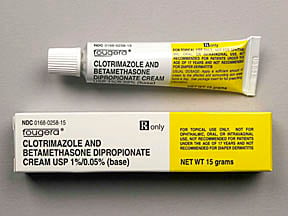
Clotrimazole-betamethasone Coupons & Savings Card – Discount Prices from $5.18
Lotrisone, a combination of clotrimazole and betamethasone, is a prescription medication designed to treat fungal skin infections such as athlete's foot, ringworm, and jock itch. Clotrimazole acts as an antifungal agent by inhibiting fungal growth, while betamethasone, a potent corticosteroid, alleviates inflammation, redness, and itching associated with these infections. This medication is not suitable for individuals under 17 years of age due to potential side effects related to corticosteroids, including hormonal changes and growth issues. Always consult your healthcare provider for advice tailored to your specific medical needs.
Our coupons are free to use. Before paying, show the pharmacist your Clotrimazole-betamethasone savings card to get your free discount. Use our filters below to edit the prescription box to match your needs. The Clotrimazole-betamethasone prices will update based on your prescription needs. Above our Clotrimazole-betamethasone coupons, you can change your location to see pharmacy prices and costs in other areas. We're here to help you buy Clotrimazole-betamethasone at the lowest price with our prescription discount card.
My prescription
Edit
15GM of 1-0.05%, Clotrimazole-betamethasone (1 Tube)
Select pharmacy

CVS
$19.67
COUPON PRICE
Walmart
$5.18
COUPON PRICE
Albertsons
$9.99
COUPON PRICE
Walgreens
$11.84
COUPON PRICEClotrimazole-betamethasone savings card
Show this card to your pharmacist
Walmart
$5.18
BIN
ID
PCN
GRP
019876
LH30140614
CHIPPO
LHX
Powered by
Lotrisone, a combination of clotrimazole and betamethasone, is a prescription medication designed to treat fungal skin infections such as athlete's foot, ringworm, and jock itch. Clotrimazole acts as an antifungal agent by inhibiting fungal growth, while betamethasone, a potent corticosteroid, alleviates inflammation, redness, and itching associated with these infections. This medication is not suitable for individuals under 17 years of age due to potential side effects related to corticosteroids, including hormonal changes and growth issues. Always consult your healthcare provider for advice tailored to your specific medical needs.
Our coupons are free to use. Before paying, show the pharmacist your Clotrimazole-betamethasone savings card to get your free discount. Use our filters below to edit the prescription box to match your needs. The Clotrimazole-betamethasone prices will update based on your prescription needs. Above our Clotrimazole-betamethasone coupons, you can change your location to see pharmacy prices and costs in other areas. We're here to help you buy Clotrimazole-betamethasone at the lowest price with our prescription discount card.
More prescriptions for ringworm
coupons from$5.58Save 79%
coupons from$7.53Save 77%
coupons from$14.76Save 69%
coupons from$64.22Save 91%
coupons from$74.39Save 85%
coupons from$7.61Save 63%
coupons from$12.95Save 63%
coupons from$13.72Save 75%
More prescriptions for ringworm
Clotrimazole Anti-fungal Save 79%coupons from $5.58
Econazole Save 77%coupons from $7.53
Ciclopirox Treatment Save 69%coupons from $14.76
Naftin Save 91%coupons from $64.22
Oxiconazole Save 85%coupons from $74.39
Tinactin Save 63%coupons from $7.61
Mentax Save 63%coupons from $12.95
Miconazole Save 75%coupons from $13.72
Clotrimazole-betamethasone dosage forms
Use our Clotrimazole-betamethasone 15GM of 1-0.05% coupon with prices from $5.18 for 1 Tube. You can also use our Clotrimazole-betamethasone 15GM of 1-0.05% coupon with prices from $7.86 for 2 Tubes. We have a Clotrimazole-betamethasone 15GM of 1-0.05% coupon with prices from $10.54 for 3 Tubes.
Dosage Quantity Price from Per unit 15GM of 1-0.05% 1 Tube $5.18 $5.18 15GM of 1-0.05% 2 Tubes $7.86 $3.93 15GM of 1-0.05% 3 Tubes $10.54 $3.51
| Dosage | Quantity | Price from | Per unit |
|---|---|---|---|
| 15GM of 1-0.05% | 1 Tube | $5.18 | $5.18 |
| 15GM of 1-0.05% | 2 Tubes | $7.86 | $3.93 |
| 15GM of 1-0.05% | 3 Tubes | $10.54 | $3.51 |
